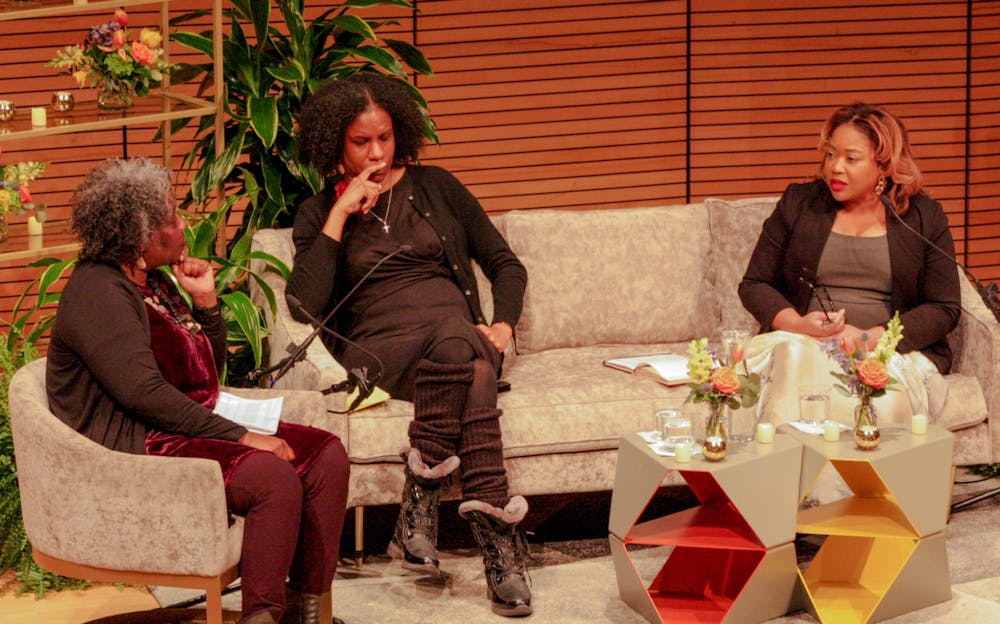To open the second half of a two-day symposium honoring the lives and legacies of Lani Guinier and bell hooks Feb. 18 and Feb. 19, moderator Beverly Guy-Sheftall, director of the Women’s Research and Resource Center at Spelman College, used three words: “Friendship, feminism and institution-building.”
The symposium, co-sponsored by Brown’s Office of Institutional Equity and Diversity and the Department of Africana Studies, brought together panelists from around the country to celebrate the two scholars and the relationship between their work and social justice.
“I started thinking about these two giant women, one impacting law and education, and another scholar and author whose works — particularly in terms of intersectionality — are just phenomenal,” Sylvia Carey-Butler, vice president for institutional equity and diversity and inclusion, said. “I kept thinking, we have to do something to celebrate them.”
Day one of the symposium focused on Lani Guinier, a legal theorist and civil rights activist who was the first woman of color to receive tenure at Harvard Law School. Day two highlighted bell hooks, an author and activist who wrote about the intersection of race, capitalism and gender. The symposium came just over a year after hooks passed away in December 2021 and Guinier passed away in January 2022.
Day 1: ‘Intellectual giants who challenged the status quo’
Day one of the symposium began with a performance from Shades of Brown, a campus multicultural a cappella group, before President Christina Paxson P’19 made introductory remarks.
In her welcome speech, Paxson described Guinier and hooks as “intellectual giants who challenged the status quo and fought to ensure that the voices of Black women were heard.”
The symposium “represents one of the many ways that Brown reaffirms our values as a community that, first and foremost, advances knowledge, welcomes diversity and respects human dignity,” she said.
Following Paxson’s remarks, Professor of Sociology Prudence Carter introduced and moderated a discussion between former University President Ruth Simmons — who joined via video chat — and Crystal Williams, president of the Rhode Island School of Design.
Simmons served as the University’s 18th president from 2001 to 2012 and was the first Black president of an Ivy League university. She currently serves as president of Prairie View A&M University, though she plans to step down at the end of February to join Rice University as a distinguished fellow.
Williams, who previously served as vice president and associate provost for community and inclusion at Boston University, was named RISD’s 18th president in December 2021, becoming the school’s first Black president. Together, the two discussed the importance of diversity in education.
According to Simmons, education played a critical role in reshaping society after the Jim Crow era. “Lies were unmasked” through education, she said.
Williams added that diversity is crucial to improving education. “When you have multiple perspectives around the table, the knowledge that is generated at that table is fundamentally deeper, wiser, broader (and) better,” she said.
Both speakers agreed that working on issues of diversity, equity and inclusion is an inherently complex process, as Williams cited the important role institutional leaders play in facilitating discussions about the issues.
Carter also asked the panelists to share their thoughts on the future of affirmative action in the face of this summer’s upcoming Supreme Court ruling — which could overturn race-conscious admissions in American colleges and universities. Simmons and Williams both expressed concerns about educational access becoming more restrictive if the Court strikes down affirmative action.
Still, Simmons added that she believes a comparable policy will replace affirmative action if it is struck down.
Later in the day, Danielle Holley, dean of Howard University’s School of Law, and Tricia Rose, professor of Africana studies spoke. Another session focused on Black women in law, featuring Gerald Torres, professor of environmental justice and professor of law at Yale, and moderated by Harvard professor of African and African American studies Evelynn M. Hammonds, also a professor at the Harvard School of Public Health’s Department of Social and Behavioral Sciences.
Day 2: ‘bell never hesitated to tell you what’s what’
Guy-Sheftall and M. Shadee Malaklou, director and founder of the bell hooks center at Berea College, kicked off the symposium’s second day with a conversation. Both speakers worked closely with hooks throughout their careers.
Reflecting on her 40-year friendship with hooks, Guy-Sheftall said that what she came to “cherish about the embrace of a dissonant feminist identity,” she learned in conversations with hooks and from reading her work.
Guy-Sheftall noted that she first met hooks at the National Women’s Studies Association Conference in 1981, where hooks was promoting her first book. She recalled sharing her room with hooks after being informed that hooks could not afford a place to sleep.
The two panelists received questions about challenges to diversity, equity and inclusion, with a focus on bans on hooks’ writings in schools — such as Florida’s rejection of Advanced Placement African American Studies’ initial curriculum. Malaklou said that while she is upset access to hooks’ work has been restricted, she finds power in hooks’ work existing “outside of the panopticon of the white gaze.”
Malaklou also worked closely with hooks and spent time with her in the final years of her life. While reflecting on this relationship, Malaklou remembered hooks calling on her to improve the curriculum at Berea and address faults in her own life.
“bell never hesitated to tell you what’s what,” Malaklou said.
The day also included a discussion titled “writers and intellectuals on bell hooks,” featuring Riché Richardson, professor of African American literature at Cornell, writer and activist Rebecca Walker and DaMaris B. Hill, professor of creative writing, English and African American studies at the University of Kentucky. Noliwe Rooks, chair of the Department of Africana Studies at Brown, moderated the discussion. A third and final panel focused on “wild women in the world,” featuring Rooks, Hammonds and Guy-Sheftall, moderated by Carey-Butler.

Ryan Doherty was the managing editor of digital content and vice president of The Herald's 135th editorial board. He is a junior from Carmel, NY who is concentrating in chemistry and economics. He previously served as a university news and science & research editor, covering faculty and higher education.

Aniyah Nelson is a university news editor overseeing the undergraduate student life beat. She is a senior from Cleveland, OH concentrating in political science and sociology. In her free time, she enjoys listening to music and watching bloopers from The Office.





